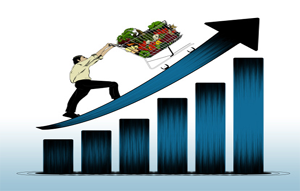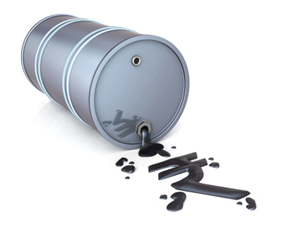Apr 13, 2025
Apr 13, 2025
 Stubborn inflation and sputtering economy are giving Reserve Bank of India a headache. The central bank in past three years raised short term interest rate 12 times expecting the demand for money to decline, the economy to cool, and the inflation to die. The economy has slowed down but the inflation persists. Now, it appears that Reserve Bank is nervous about the weak economy, so last month it lowered the interest rate to spur the economic growth.
Stubborn inflation and sputtering economy are giving Reserve Bank of India a headache. The central bank in past three years raised short term interest rate 12 times expecting the demand for money to decline, the economy to cool, and the inflation to die. The economy has slowed down but the inflation persists. Now, it appears that Reserve Bank is nervous about the weak economy, so last month it lowered the interest rate to spur the economic growth.
However, it is not possible to lower the inflation and improve the growth at the same time. It is like a cricket bowler trying to out two batsmen at the same time, one is betting while the other is standing at the opposite end of the wicket.
Inflation means one is paying more for an item or a service than one used to, and many of the more important causes are listed below.
 Imports: We import oil from other countries to produce petroleum products including petrol for our vehicles. And every time prices of imported oil go up or the value of rupee goes down, we pay higher prices at pump. This is true for everything we import.
Imports: We import oil from other countries to produce petroleum products including petrol for our vehicles. And every time prices of imported oil go up or the value of rupee goes down, we pay higher prices at pump. This is true for everything we import.Here are two of many solutions.
One, Reserve Bank of India need not concentrate on controlling inflation via interest rate. Instead, they need to soak up an excessive money supply, black and white.
Two, for a few years, the ministry of finance should collect zero income taxes from businesses (manufacturers, whole sellers, retailers, and service-providers) operating in developing states and union territories such as Andaman Nicobar Islands, Arunachal Pradesh, Assam, Bihar, Chhattisgarh, Jharkhand, JK, Lakshadweep, Manipur, Meghalaya, Mizoram, MP, Nagaland, Sikkim, Tripura, and UP.
The idea to free businesses from income tax burden is to encourage them to hire more people and increase the supply of goods and services. Their actions will boost economic growth, increase employment, reduce inflation, and indirectly reduce the violence.
Images (c) Gettyimages.com
28-May-2012
More by : Vasant G. Gandhi